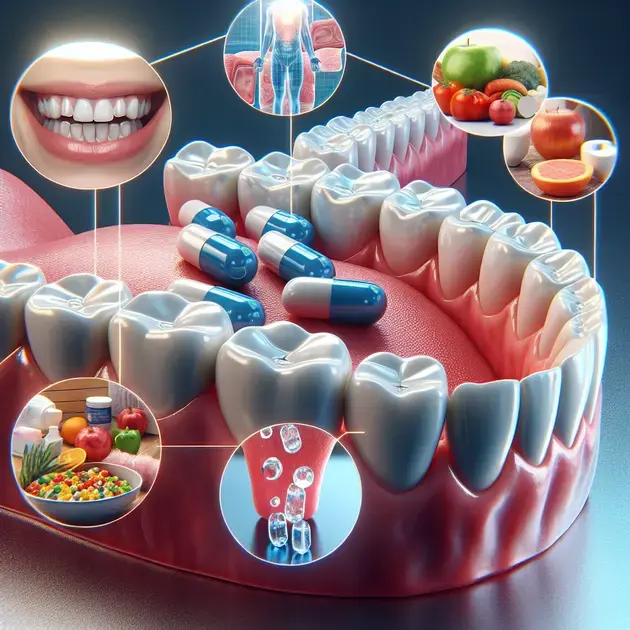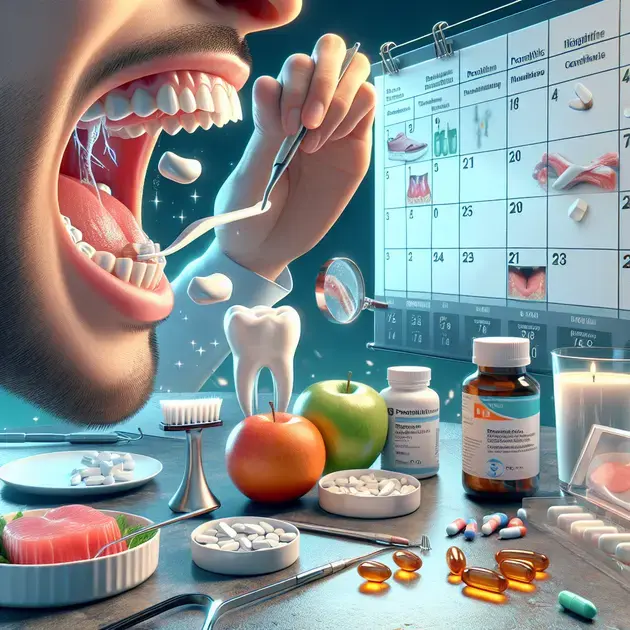Looking for effective medication for periodontitis? You’ve come to the right place. This comprehensive guide will provide you with all the information you need to understand and treat this common inflammatory condition that affects the gums and bone supporting the teeth.
Periodontitis can lead to serious complications if left untreated, including tooth loss and increased risk of other systemic diseases. With the right medication and proper care, you can effectively manage and even reverse the progression of periodontitis. Keep reading to learn more about the most up-to-date treatment options available.

Understanding Periodontitis Treatment Options
When it comes to understanding periodontitis treatment options, it is essential to first consult with a dental professional to assess the severity of the condition. One common treatment option is scaling and root planing, which involves deep cleaning to remove plaque and tartar from the teeth and roots. This procedure can help prevent further progression of periodontitis.
Another treatment option is the use of antibiotics to reduce bacteria and infection in the gums. Your dentist may prescribe antibiotics in the form of pills or a mouth rinse to help combat the spread of periodontitis. It is important to follow your dentist’s instructions carefully when taking antibiotics to ensure effectiveness.
In more severe cases of periodontitis, surgical intervention may be necessary. Procedures such as flap surgery or bone and tissue grafts can help repair damage caused by periodontitis and promote gum and bone regeneration. Your dentist will discuss the most suitable treatment options based on your individual needs.
For those looking for additional information on periodontitis treatment options, websites such as the American Academy of Periodontology (perio.org) provide comprehensive resources and guidelines for patients. These resources can help individuals understand the various treatment options available and make informed decisions about their dental health.
Overall, educating yourself about periodontitis treatment options and working closely with your dental provider is crucial in effectively managing and treating the condition.
The Importance of Proper Medication for Periodontitis
Proper medication plays a vital role in the treatment of periodontitis. It is important to follow your dentist’s prescription guidelines and recommendations to ensure the effectiveness of the medication. Antibiotics are commonly prescribed to help reduce bacteria and inflammation in the gums, aiding in the treatment of periodontitis.
In addition to antibiotics, antimicrobial mouth rinses can also be beneficial in controlling bacteria in the mouth and preventing the progression of periodontitis. Using the mouth rinse as directed by your dentist can help promote oral health and improve the condition of your gums.
Nonsteroidal anti-inflammatory drugs (NSAIDs) may be recommended to alleviate pain and swelling associated with periodontitis. These medications can help manage symptoms and improve the overall comfort of individuals undergoing treatment for periodontitis.
It is essential to communicate with your dentist about any medications you are taking, including over-the-counter drugs and supplements, to ensure there are no negative interactions that could impact your periodontitis treatment. Your dentist can provide guidance on the best medication regimen for your specific situation.
For more information on proper medication for periodontitis, reputable sources such as the National Institute of Dental and Craniofacial Research (nidcr.nih.gov) offer detailed insights into the role of medication in periodontal treatment. By staying informed and following your dentist’s recommendations, you can effectively manage periodontitis with the right medication.
Effective Strategies for Managing Periodontitis Symptoms
Managing periodontitis symptoms requires a multifaceted approach that includes regular dental visits, proper oral hygiene practices, and lifestyle modifications. One effective strategy is to maintain good oral hygiene by brushing and flossing daily to remove plaque and prevent bacteria buildup that can exacerbate periodontitis.
Incorporating an antimicrobial mouth rinse into your oral care routine can help reduce bacteria in the mouth and promote gum health. Using the mouth rinse as recommended by your dentist can complement your brushing and flossing efforts in managing periodontitis symptoms.
Diet plays a significant role in periodontal health, so adopting a balanced diet rich in fruits, vegetables, and lean proteins can support overall gum health. Avoiding sugary foods and beverages that can contribute to plaque formation is essential in managing periodontitis symptoms and preventing further damage to the gums.
Regular dental check-ups and cleanings are vital in monitoring the progress of periodontitis and addressing any emerging issues promptly. Your dentist can provide personalized recommendations and treatment options to help manage your symptoms effectively and maintain optimal oral health.
For additional support in managing periodontitis symptoms, mobile applications like “Dental Expert” and websites such as the American Dental Association (ada.org) offer valuable resources and tips on oral care practices specific to periodontal health. By implementing these effective strategies and staying proactive in your dental care, you can effectively manage periodontitis symptoms and prevent complications.

The Importance of Proper Medication in Periodontitis Management
When it comes to managing periodontitis, proper medication plays a crucial role in controlling the progression of the disease. Medications prescribed by your dentist or periodontist can help reduce inflammation, fight infection, and promote healing in the gums and surrounding tissues. These medications may include antibiotics, antimicrobial mouth rinses, and pain relievers. It is essential to follow your healthcare provider’s instructions carefully and take the prescribed medications as directed to achieve the best results.
In addition to taking medications, maintaining good oral hygiene practices is essential for managing periodontitis effectively. Brushing and flossing regularly, using an antibacterial mouthwash, and visiting your dentist for regular cleanings and check-ups are all crucial steps in preventing further damage to your gums and teeth. Proper medication, combined with a consistent oral care routine, can help control the symptoms of periodontitis and improve your overall oral health.
Another important aspect of proper medication in periodontitis management is addressing any underlying health conditions that may be contributing to the disease. Conditions such as diabetes, cardiovascular disease, and autoimmune disorders can impact the health of your gums and make you more susceptible to periodontitis. Your healthcare provider may recommend managing these conditions through medication, lifestyle changes, and other interventions to improve your gum health and prevent the progression of periodontitis.
Overall, proper medication is an integral part of a comprehensive treatment plan for periodontitis management. By taking the prescribed medications, maintaining good oral hygiene practices, and addressing any underlying health issues, you can effectively control the symptoms of periodontitis and improve the overall health of your gums and teeth.
Effective Ways to Improve Periodontitis Symptoms
Improving periodontitis symptoms requires a combination of proper medication, lifestyle changes, and good oral hygiene practices. In addition to taking prescribed medications, there are several effective ways to alleviate symptoms and promote healing in the gums and surrounding tissues. One of the most crucial steps is to quit smoking, as smoking can exacerbate periodontitis and hinder the healing process.
Implementing a healthy diet rich in vitamins and nutrients can also help improve periodontitis symptoms. Foods high in antioxidants, such as fruits, vegetables, and green tea, can help reduce inflammation and support gum health. Drinking plenty of water and avoiding sugary beverages can also contribute to better oral health and symptom management.
Regular exercise is another essential aspect of improving periodontitis symptoms. Physical activity can boost circulation, reduce inflammation, and support overall gum health. Incorporating stress-reducing activities such as meditation, yoga, or deep breathing exercises can also help alleviate symptoms and promote healing in the gums.
Finally, maintaining regular dental visits for cleanings and check-ups is crucial for managing periodontitis symptoms. Your dentist can monitor the progression of the disease, make recommendations for treatment adjustments, and provide professional cleanings to remove plaque and tartar buildup. By following these effective ways to improve periodontitis symptoms, you can support the healing process and enhance the overall health of your gums and teeth.
Optimizing Treatment Options for Periodontitis Recovery
Optimizing treatment options for periodontitis recovery involves a comprehensive approach that addresses the underlying causes of the disease and focuses on promoting healing in the gums and surrounding tissues. In addition to taking prescribed medications and following good oral hygiene practices, there are several treatment options that can enhance the recovery process. One effective option is scaling and root planing, a deep cleaning procedure that removes plaque and tartar buildup from below the gumline.
Your dentist may also recommend surgical interventions such as gum grafting, bone grafting, or flap surgery to address advanced cases of periodontitis and promote tissue regeneration. These procedures can help restore the health and structure of the gums and provide a foundation for long-term recovery. In some cases, laser therapy or antibiotic treatments may be used to target bacteria and promote healing in the gums.
Collaborating with your healthcare provider to develop a personalized treatment plan is essential for optimizing periodontitis recovery. By following their recommendations, attending regular check-ups, and making necessary lifestyle changes, you can improve the effectiveness of treatment options and support the healing process. With a proactive approach and a commitment to oral health, you can optimize your chances of recovering from periodontitis and maintaining a healthy smile for years to come.
Conclusion
Proper medication is a crucial component in effectively managing periodontitis. Medications prescribed by healthcare providers help reduce inflammation, fight infection, and promote healing in the gums. By following prescribed medications and maintaining good oral hygiene practices, individuals can control the symptoms of periodontitis and enhance their overall oral health. Addressing underlying health conditions that contribute to the disease is also essential for effective management.
To improve periodontitis symptoms, a holistic approach including lifestyle changes, proper medication, and good oral hygiene practices is necessary. Quitting smoking, adopting a healthy diet rich in antioxidants, regular exercise, and stress-reducing activities can alleviate symptoms and support gum health. Additionally, regular dental check-ups play a vital role in managing periodontitis symptoms by monitoring the disease’s progression and providing necessary treatments to promote healing.
Optimizing treatment options for periodontitis recovery involves a comprehensive strategy focused on addressing the root causes of the disease. Procedures such as scaling and root planing, surgical interventions, laser therapy, and antibiotic treatments can enhance the recovery process and restore gum health. Collaborating with healthcare providers to develop personalized treatment plans, attending regular check-ups, and making lifestyle changes are key steps in optimizing recovery from periodontitis and maintaining long-term oral health.



